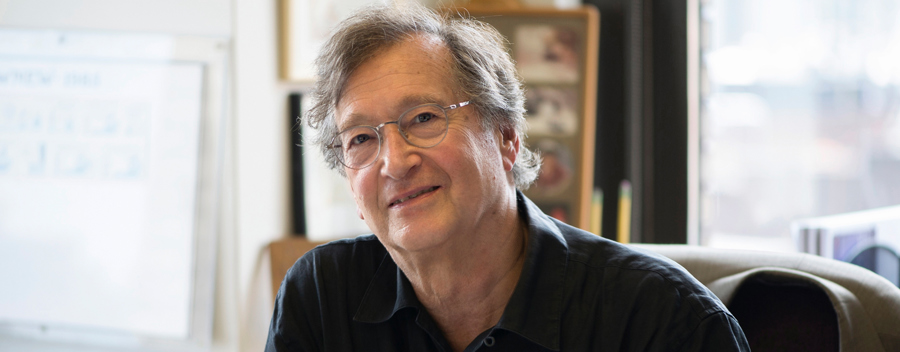
Meet Daniel Ratner '82, partner at Levy Ratner and general counsel to 1199 SEIU
In April, Brooklyn Law School’s Labor & Employment Law Association honored Daniel J. Ratner ’82, a partner at the firm of Levy Ratner and general counsel to 1199SEIU, the largest healthcare union in the country, with its 2016 Distinguished Alumni Award. The award was presented by Laureve Blackstone ’06 and Susan Cameron ’06, both members of Levy Ratner.
“Dan is extremely knowledgeable and confident, but never stops asking questions, even of those with far less experience,” Blackstone said at the award presentation attended by students and graduates. “He thinks big and strives for the best outcome, but is ever pragmatic in achieving success for his clients.”
Ratner is a labor law powerhouse. The College of Labor and Employment Lawyers, which honors leading labor and employment lawyers nationwide, inducted Ratner as a fellow in 2014, an honor reserved for those, in the words of former National Labor Relations Board Chairman John Truesdale, “whose professional achievements symbolize the highest level of expertise, integrity, and leadership.” Throughout his long career, Ratner has been instrumental in achieving significant legal victories for workers. Ratner was a member of the AFL-CIO national litigation team that established the healthcare bargaining unit rules through NLRB rule making and subsequent cases that went to the United States Supreme Court. He also was responsible for the legal victory that initially established the right of graduate teaching assistants to organize at New York University under the National Labor Relations Act.
As general counsel to 1199SEIU United Healthcare Workers East, which has more than 400,000 members, he oversees the union’s bargaining, legal strategy, litigation, and internal governance. Among the agreements he has bargained is the master contract between 1199SEIU and the League of Voluntary Hospitals, a multibillion-dollar agreement covering approximately 150,000 workers in more than 100 hospitals and nursing homes.
After decades sitting across the bargaining table from management, Ratner says the art of the labor bargain has nothing to do with how experienced or articulate the lawyers are. “It’s the strength of the workers,” he said. “They will determine the nature of the agreement. An experienced bargainer can help fashion the terms so that a strike is not necessary, but in the end it’s about the workers—how important they are, how active they are, how connected they are to the community and their religious leaders, and how prepared they are to strike. That is really the key.”
The son of a salesman and a nurse, Ratner says the seeds of advocacy were planted early on. “I was in college during the height of the anti-war era and activism was rampant,” he said. “I was studying both economics and the times.”
After graduating from George Washington University in 1969, he became a field organizer for 1199SEIU. There, he organized thousands of workers and negotiated and enforced collective bargaining agreements, while pursuing a master’s degree in economics from the New School in the evening.
But the life of a labor organizer was stressful and Ratner and his wife were starting their family. Ratner decided law school would lead to a “saner lifestyle.”
“The hours as an organizer are just nuts,” he said. “You could go out in the morning when you were on strike and not know if you were going to come back or if you were going to get arrested. I was running picket lines from midnight to 8 a.m. when I took my LSATs.”
In law school he continued to work as a union organizer during the day (District 65 UAW), and spent his evenings in class, excelling and joining the staff of the Brooklyn Law Review.
Ratner started his legal career at Murray Gordon, a firm that represented public sector labor unions. In 1986, he joined the Writers Guild, representing writers and producers in the television and motion picture industries. He played a critical role in organizing the writers for Major League Baseball Productions and bringing them into the Writers Guild. There he met labor attorney Richard Levy and joined him at his firm, Eisner and Levy. In 1993, the two formed their own firm, Levy Ratner, which now has 23 lawyers in Manhattan and represents labor unions and workers in employment discrimination and civil rights cases.
Ratner maintains strong ties to the Law School, hiring graduates, including Blackstone and Cameron, and Jessica Apter ’15. Levy Ratner also regularly hires Law School students as law clerks and summer associates.
“I got a great legal education at Brooklyn, and I am so grateful to the school for allowing me to obtain a terrific education at night,” he said. “Had they not had that program I could never have become a lawyer.”
—Andrea Strong ’94